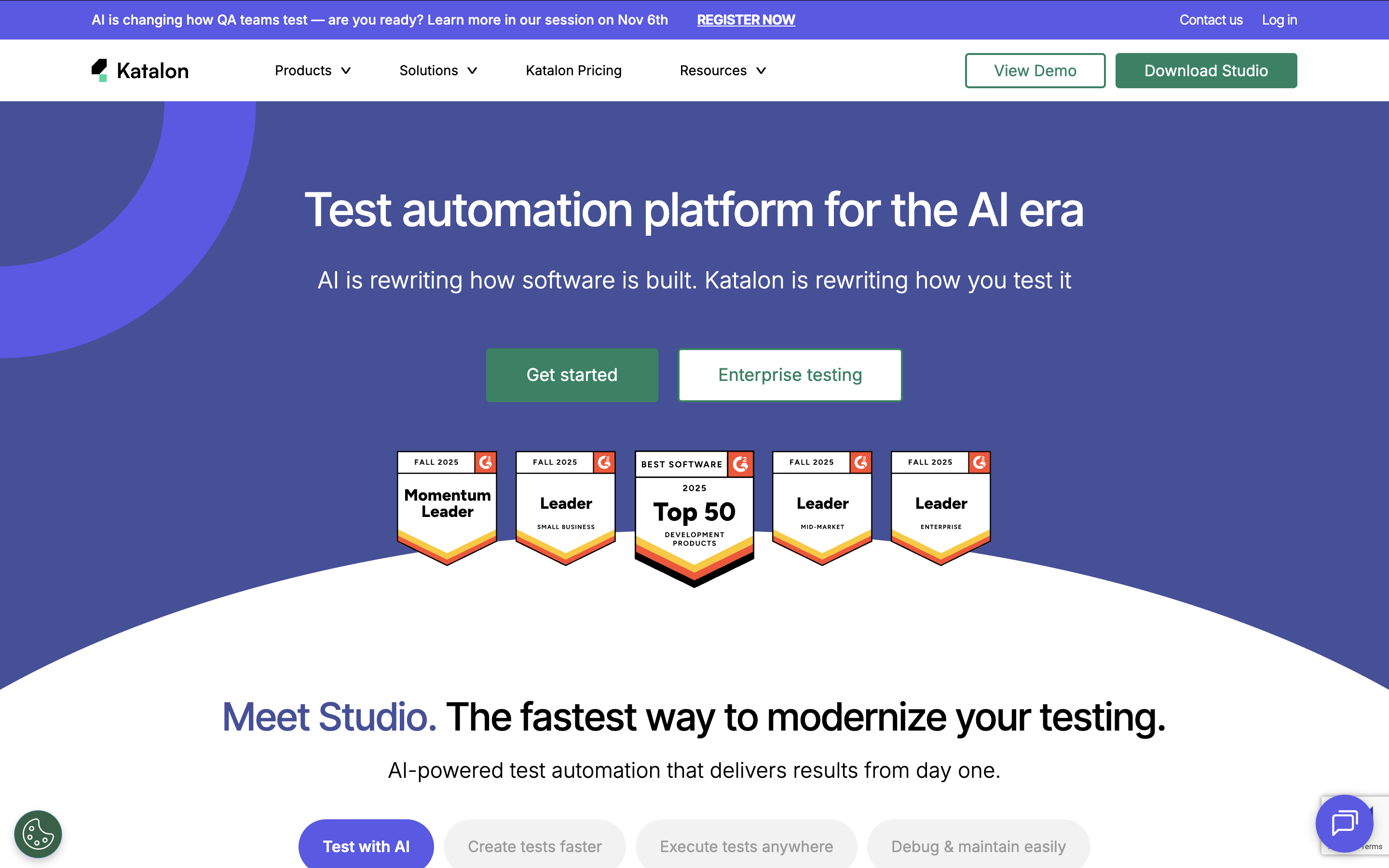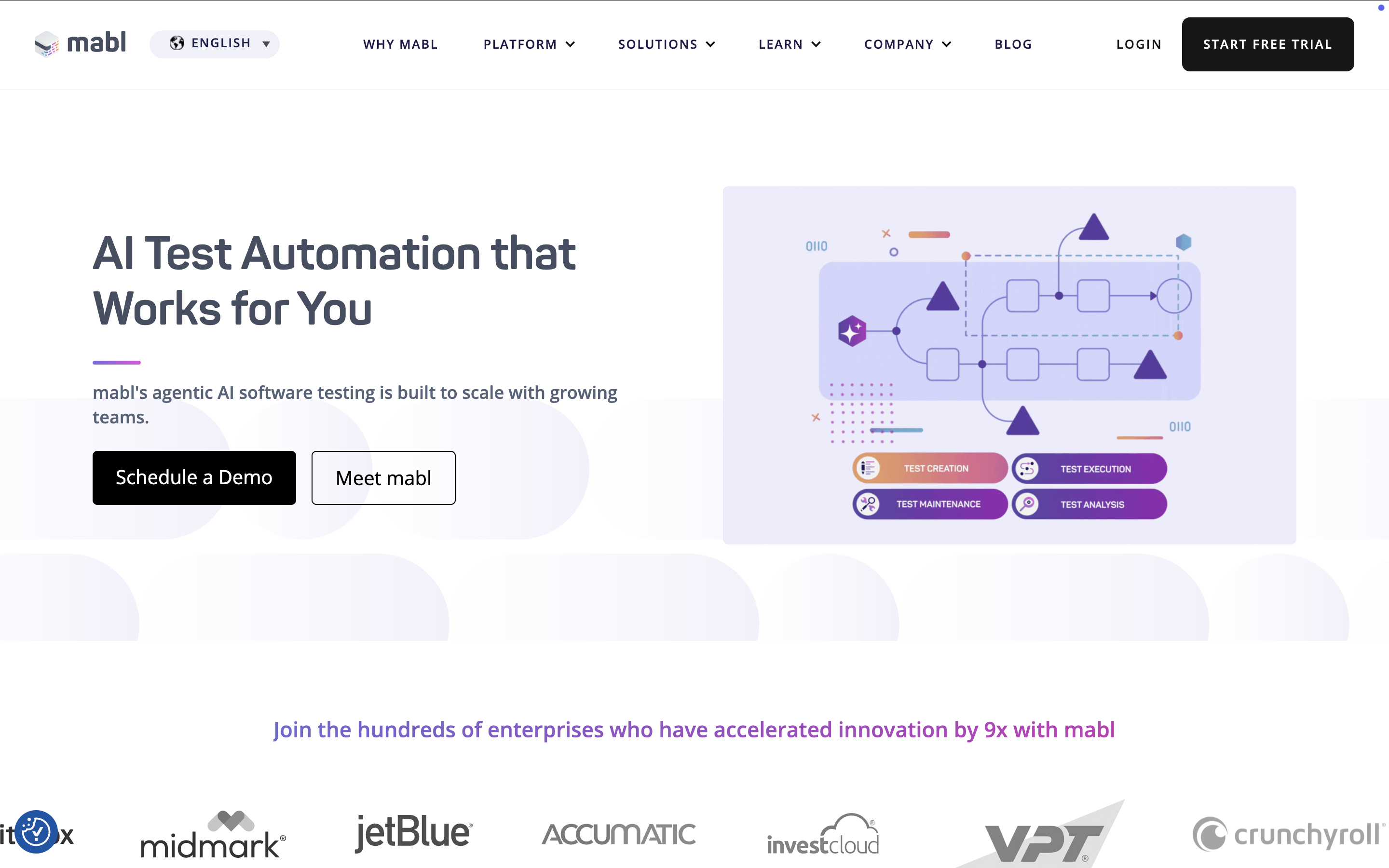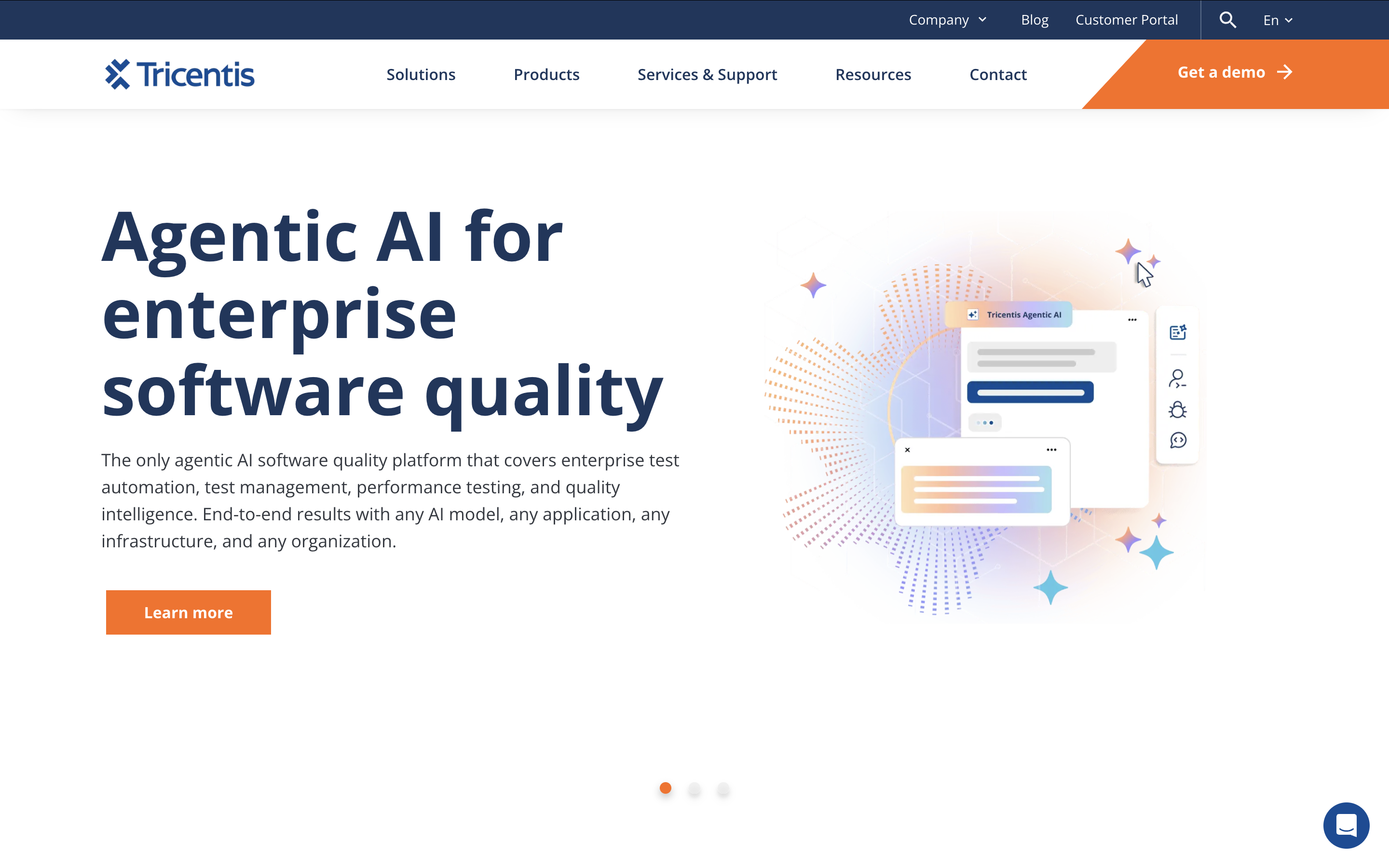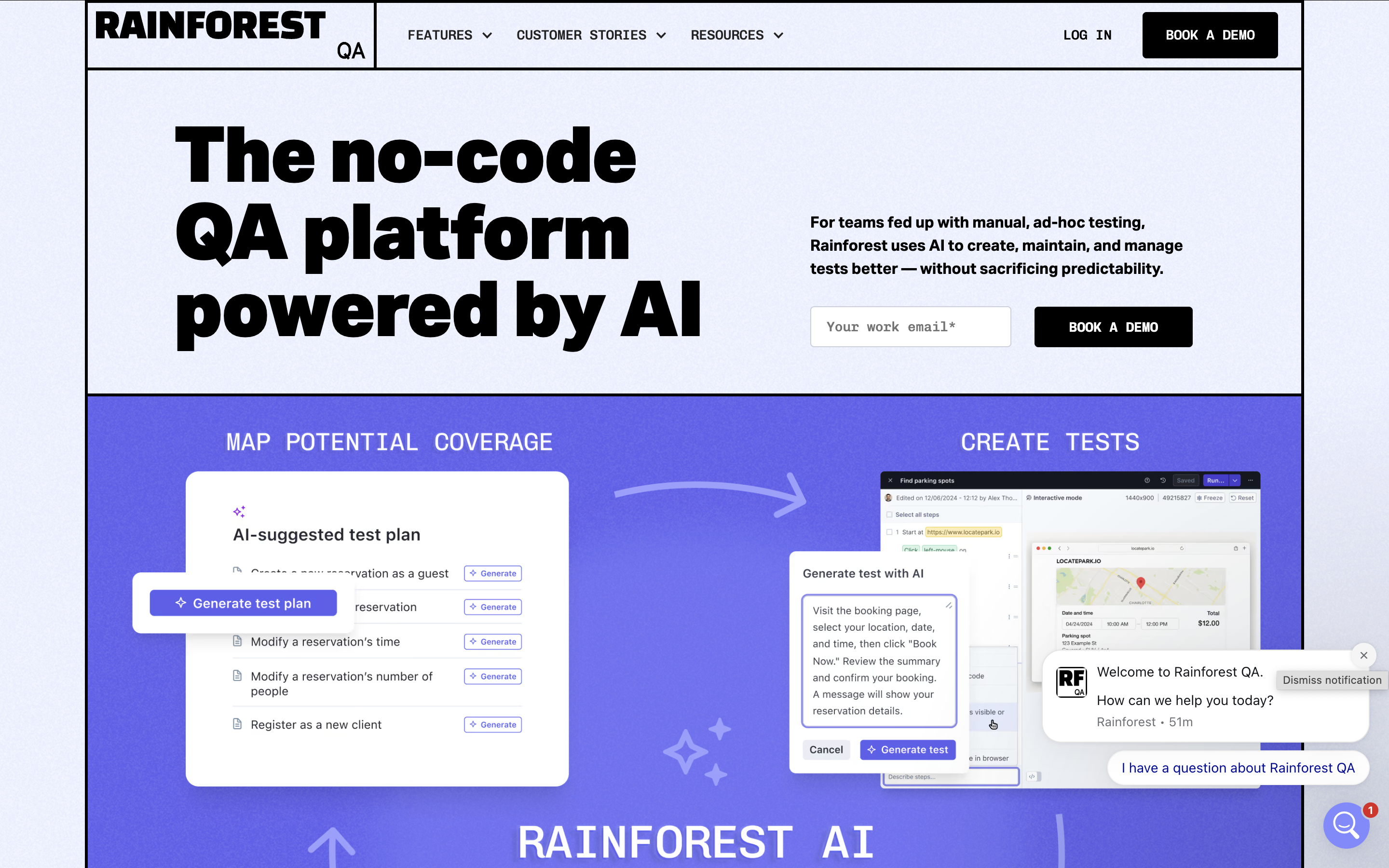Top 10 Low-code Testing Tools | Updated For 2025
Learn with AI
Low-code testing tools simplify the testing process. All of the complexity of coding is taken care of by the features designed by the development team of the tool.
Thanks to these low-code tools, a little bit of technical know-how is more than enough to start testing. It opens up QA to a broader audience.
In this article, we review the top low-code testing tools in 2025.
1. Katalon [All-in-one Low-code Testing Tool]

Katalon accompanies your QA team throughout the entire software testing life cycle.
With Katalon, you can write tests in 3 modes (no-code, low-code, full-code), manage tests in a centralized dashboard, schedule test runs, execute tests across environments, and generate detailed reports.

And all of that can be done for web testing, API testing, and mobile application testing. In other words, Katalon is a centralized platform for all of your testing activities.
Feature highlights:
- Suitable for any testing needs, from individual testers, QA teams, to large enterprises
- No-code, low-code, and full-code scripting in Groovy
- Automatic test maintenance
- Support web, mobile, API testing. Packaged app testing also available.
- Run tests across local machine, cloud, on-premise environments, with easy CI/CD integrations
- AI-powered regression testing with TrueTest
- Data-driven testing and BDD testing supported
- Diverse integration ecosystem with ALM and CI/CD tools
- Detailed reports with analytics, screenshots, videos, HTML Snapshot, and Test Suite report email
- Detailed technical documentation and video tutorials on Katalon Academy
Visit Katalon Website | G2 Reviews
Price: Free and flexible paid plans
Start Katalon Free Trial Today
2. Mabl

Mabl is one of the first AI testing tools. It offers AI-powered features to improve the software testing process.

Key Features:
- Low-code test capability to enhance quality
- Intuitive intelligence with automated healing
- Data-driven features for real-world test cases
- Comprehensive end-to-end testing through APIs
- Provides valuable insights for developers using data
- User-friendly dashboard for seamless navigation
3. TestComplete

TestComplete can automate functional UI testing for desktop, mobile, and web applications. With built-in support for 500+ controls and third-party frameworks, TestComplete is a good software testing tool, able to handle and identify dynamic UI elements in most current technologies.

Feature highlights:
- Support JavaScript, Python, VBScript, JScript, Delphi, C++, C#
- Record & playback, manual, and scripting modes with built-in keywords
- Property-based and AI-powered visual recognition
- Parallel execution across browsers and devices
- Compatible with other testing frameworks, CI/CD tools, and the SmartBear ecosystem.
Visit TestComplete Website | G2 Reviews
Pricing tiers: TestComplete Base, TestComplete Pro, and Custom Pricing
4. Tricentis Tosca

Tricentis Tosca is a comprehensive automated software testing tool for web, API, mobile, and desktop testing. It utilizes a model-based testing approach, enabling users to scan an application’s UI or APIs to create intuitive, business-friendly test models.

Feature Highlights:
- Codeless test creation with high reusability using a model-based approach
- Risk-based test optimization with smart test design and prioritized requirements
- Service virtualization for realistic testing environments
- Extensive API scanning with broad support for API technologies
- Parallel and cross-platform testing for enhanced efficiency
- Seamless integrations with testing frameworks and CI/CD tools
Visit Tricentis Tosca Website | G2 Reviews
Price: Contact sales
5. TestSigma

TestSigma is a rising software testing tool that supports testing across various AUTs, including web, API, desktop, and mobile.

Key Features:
- No-code testing platform that enables test creation in plain English.
- AI-powered features for streamlined test maintenance and cloud-based execution.
- User-friendly test reports with debugging tools such as screenshots, videos, and logs, customizable to fit your needs.
- Seamless integration with popular CI/CD tools, with the added benefit of cloud accessibility.
Visit Testsigma Website | G2 Reviews
Pricing: Free plan available, with paid plans starting from $349/month
6. BugBug

BugBug is a no-code test automation tool designed for web applications and websites, prioritizing ease of use and efficiency. It caters to both technical and non-technical users with an intuitive interface for creating, editing, and running automated tests—no extensive coding skills required.

Key Features & Advantages:
- Automate web application test scenarios with a simple record-and-playback approach.
- Intuitive Record & Playback that captures user interactions as test steps, enabling easy replay for bug detection and functionality verification.
- Supports reusable components, custom variables, and test step re-recording for effortless updates.
- Verifies and corrects selectors automatically, allowing manual edits or re-recording when necessary.
- Waiting conditions & active waiting to ensure elements are ready before execution, minimizing flaky tests due to timing issues.
- Cloud execution & local testing to run tests locally or leverage BugBug’s cloud infrastructure for faster, parallel testing.
Visit BugBug Website | G2 Reviews
Price: Free or from $99/month for Cloud Testing Plan
7. Leapwork

Leapwork simplifies UI test automation with a smart recorder that captures and defines elements with a click, turning test cases into automated flows effortlessly. Reusable sub-flows reduce maintenance and improve efficiency.

Key features include:
- Failure diagnosis with video recordings, data insights, and logs.
- Scalable testing across cloud providers, local, or remote machines, eliminating the need for physical devices.
Documentation: Leapwork Documentation
8. Rainforest QA

Rainforest offers a web-based platform enabling users to quickly generate automated test scripts with simple, plain-English prompts such as: “Create a new user account” or “Fill out the demo form with dummy data”.

Rainforest's AI can also update tests automatically to reflect changes in the application, eliminating the need for time-consuming manual updates after minor app modifications. There is even a Test Manager that verifies test results to prevent errors and ensure accuracy.
Key Features:
- Create, manage, and run automated tests with a no-code framework, organizing them into groups, schedules, and priorities.
- A global network of QA testers is available 24/7 for scripted application testing.
- A dedicated QA Concierge handles test creation and upkeep for both automated and manual tests.
- Tests run on virtual machines supporting multiple OS versions and browsers.
- Automated tests complete in ~4 minutes, while manual tests take ~20 minutes.
- Get debugging insights with repro steps, video recordings, HTTP logs, and browser logs.
- Testers perform unscripted tests to find bugs and provide usability feedback.
Changelog: Rainforest QA Changelog
9. AccelQ

Accelq is an AI testing tool that automates test designs and plans, and executes them. It is beneficial for testing UI, mobile, API, and PC software, providing a comprehensive view of the entire QA lifecycle.

Key features:
- Automated test generation capabilities
- Intuitive dashboard included
- Features for predictive analysis and lifecycle test management
- API and comprehensive test view from A to Z
Visit ACCELQ Website | G2 Reviews
10. Functionize

Functionize is a cloud-based automated testing tool used for functional, performance, and load testing, providing a comprehensive solution. This tool incorporates AI/ML technology to accelerate test creation, diagnosis, and maintenance.

You can effortlessly perform tests by typing your desired test scenarios in plain English, and the tool's natural language processing (NLP) generates functional test cases.
Key features:
- AI and NLP-based automation testing
- Test analytics and reporting tool for monitoring test results and software functionality
- Self-healing capabilities
- Test planning and editing capabilities
- Multiple browser support tools
Visit Functionize Website | G2 Reviews
Benefits of a Low-code Automation Testing Tools
- It allows you to write tests faster. The complexity of coding is simplified into the tool's features, which usually have drag-and-drop mechanism so that anyone can craft a test they want.
- It doesn't require coding, so even non-technical users can contribute to test automation.
- Many low-code test automation tools integrate seamlessly with the CI/CD pipeline for continuous testing.
What To Look For When Choosing Low-code Testing Tools?
- Ease of Use – Intuitive UI with drag-and-drop features for quick test creation.
- Integration – Supports CI/CD pipelines, test management tools, and cloud platforms.
- Scalability – Handles growing test cases and complex workflows efficiently.
- Cross-Browser & Cross-Platform Support – Ensures compatibility across devices and browsers.
- Automation Capabilities – Offers robust automation with minimal scripting.
- Reporting & Analytics – Provides clear, actionable insights and real-time monitoring.
- Collaboration Features – Enables seamless teamwork with role-based access and version control.
- Support & Community – Reliable customer support and an active user community for troubleshooting.
|
FAQs on Low-code Testing Tools
What is a low-code testing tool (and who is it for)?
Low-code testing tools reduce or hide coding complexity using things like record-and-playback, drag-and-drop, built-in keywords, and sometimes plain-English steps—so non-technical testers and mixed-skill teams can build and run automated tests faster.
What should we look for when choosing a low-code testing tool?
Key criteria from the article include: ease of use, CI/CD and tool integrations, scalability, cross-browser/cross-platform support, strong automation capabilities, solid reporting/analytics, collaboration features, and dependable support/community.
Which tools are highlighted as top low-code options in 2025?
The article lists these 10: Katalon, Mabl, TestComplete, Tricentis Tosca, TestSigma, BugBug, Leapwork, Rainforest QA, AccelQ, and Functionize.
Why is Katalon positioned as an “all-in-one” low-code testing tool?
Because it supports no-code/low-code/full-code, centralized test management, scheduling, cross-environment execution (local/cloud/on-prem), and detailed reporting—across web, API, and mobile (plus packaged app testing), with CI/CD + ALM integrations and AI features like TrueTest.
What are the main benefits of low-code automation tools for QA teams?
They help teams write tests faster, let non-coders contribute to automation, and often integrate with CI/CD pipelines to enable continuous testing and broader coverage with less manual effort.

%20(4).png)